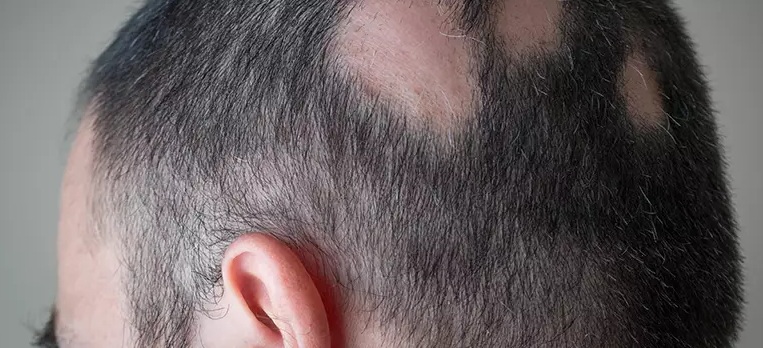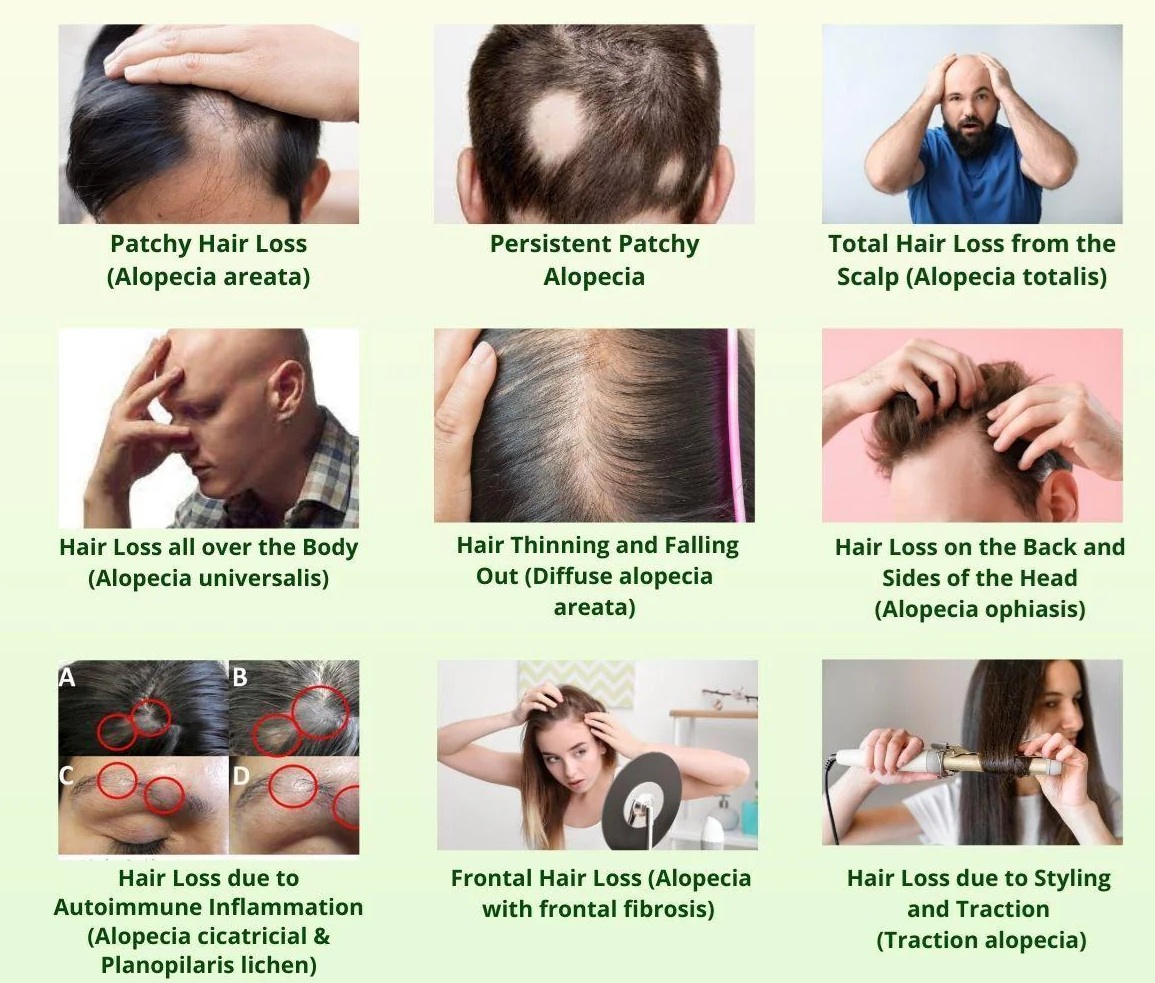Alopecia
Alopecia is considered an autoimmune disease, in which the immune system, which is designed to protect the body from foreign invaders such as viruses and bacteria, mistakenly attacks the hair follicles, the structures from which hairs grow. This can lead to hair loss on the scalp and elsewhere.

Absence of hair from skin areas where it is normally present. Popular name-Hair loss.
Symptoms of Alopecia
may include
Hair loss occurs in small, round patches that are usually about the size of a quarter. It can affect any part of the body, but most commonly affects the head and face.
Male pattern hair loss- Thinning or complete loss of hair at the hairline and top of the head.
Female diffuse hair loss- A gradual thinning of hair, especially on the top of the head. The hairline usually stays the same.
Alopecia areata- Broken hairs, or hairs easily removed; one or more round or oval bald patches
Types of Alopecia

1. Alopecia areata
2. Tinea capitis
3. Hyper androgenism
4. Seborrheic dermatitis
5. Radiation / anti cancer drugs
6. Postpartum, post febrile
7. Post
8. Post surgery / trauma
9. Hypothyroidism, Addison’s disease
10.Colchicine
11.Excess of Vitamin A
12.Heavy metals
Causes of Alopecia
The body’s immune system mistakenly attacks the hair follicles, but the reasons for this are not clear. Few may be
Aging
Genetics
Illness
Some medications, such as chemotherapy
Malnutrition
Autoimmune disorder, in the case of alopecia areata
In Further diffuse
Androgenetic
Bad liver or kidney function
Child birth
Drugs and chemicals
Emotional stress
Fever (high)
Growth (malignant)
Hypothyroidism
Hemorrhage
Iron deficiency
Inadequate diet
Scarring Alopecia
| Lichenplannus | DLE |
| Morphea | Sarcoidosis |
| Cutaneous lupus | Folliculitis |
| Cutaneous metastasis | Decal vans |
Treatment Of Alopecia
There is no cure for alopecia areata, but treatments and therapies can help hair regrow. Hair often regrows on its own, especially if there are only a few patches of hair loss that have been present for less than a year.
Treat tinea capitis or seborrhea
Treat the general systemic aliment
Local 2% minoxidil
For androgenic hair loss, finasteride 0.5 mg ( 5 a reductase inhibitor)
Spironolactone and cimetidine are also antiandrogenic
Surgical and other Procedures
Surgical options include hair transplants, scalp reduction, and strip or flap grafts
Prognosis of Alopecia
The course of alopecia areata varies from person to person. Some people have one episode of hair loss, while others have bouts throughout their lives. Hair may not regrow fully in some people.
Contagious Alopecia
No, alopecia areata is not contagious and cannot spread from person to person.
A board-certified dermatologist can help determine if you have alopecia areata and what may help regrow your hair.
medlight2u.com
A light on Practice of Medicine (The information provided is for informational and educational purposes only and should not be considered professional advice)
Acne Acne vulgaris Acute Renal Failure Adrenal cortex Angina Angina Pectoris Aortic Regurgitation (AR) Aortic Stenosis (AS) Chest pain Chronic pyelonephritis Coarctation of Aorta Cough cyanosis Cystic acne Dehydration depression Diabetes Mellitus Diagnosis of Aortic Stenosis Dr.KTS DR K TAMILSELVAN Fatigue Heart Failure Hypertension Hypokalemia Hypothyroidism Ischemic Heart Disease LBBB Mitral Incompetence Mitral insufficiency Mitral valve prolapse Nocturia Patent Ductus Arteriosus PDA Polyuria Proteinuria pulmonary hypertension Pulmonary Stenosis ST Depression Symptoms of Acne Syncope Treatment for acne valvular heart disease Ventricular Septal Defect VSD Zits


Leave a Reply